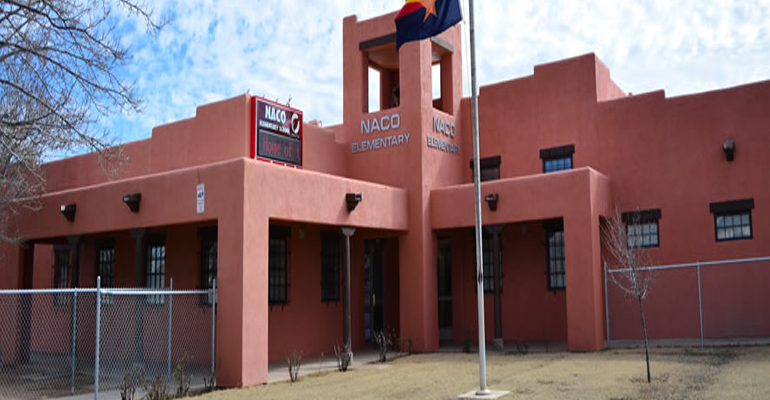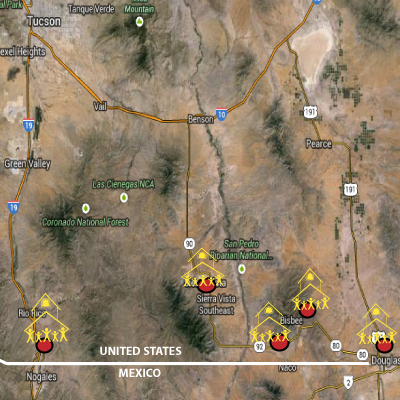
As Arizona gubernatorial candidate and former member of the Arizona Board of Regents, Fred DuVal attacked his Republican challenger, Doug Ducey for the horrible job Arizona does funding its schools, and the lousy job it does educating kids, the crack PR staff at the University of Arizona was touting the educational opportunities provided by University of Arizona students in the state’s most southern Title 1 schools.
“Many schoolchildren in Santa Cruz and Cochise counties pack up their belongings and head home to their families south of the U.S.-Mexico border,” wrote Amanda Ballard, with the University of Arizona (UofA) communications in a press release dated September 3, 2014. “Their schools are in rural communities and often lack resources to provide the level of quality education available in other parts of the state and the funds to recruit teachers to the area.”
“In some of the schools that we serve, there’s not a clock that works in the whole school,” Etta Kralovec, associate professor of teacher education at University of Arizona South, told Ballard.
When asked whether the practice was legal, one ADE official told the ADI, “My recollection is that students can cross borders, but have to pay tuition and the school may not claim them as residents for state aid purposes.” He referred the AZDI to Chis Kotterman with the ADE.
In an email response, Kotterman wrote:
“Any student who does not reside within the state of Arizona is not eligible for submission by a public school for state funding. Non-residents who wish to attend an Arizona public school must pay reasonable tuition set by the governing board of the school.
Foreign students who have a J-1 visa (foreign exchange student) may be admitted without payment of tuition, as may certain other classes of foreign students, but they still must reside in Arizona during their time in school.
If a student does not live within the state of Arizona, and ADE discovers via audit that the student was submitted for state funding, ADE will attempt to recover the state aid wrongfully paid, which the department has successfully done before.
Arizona schools are prohibited as a matter of federal law from attempting to determine whether or not a student is in the country legally, or even if the student has the proper visa that allows the student to cross the border to attend school, in most cases. If the student can prove to the district or charter’s satisfaction that the student resides in Arizona, then the student must be admitted. If the school is not satisfied that the student resides in Arizona, the school must charge tuition, but it still is not able to ask questions about what type of visa the student has or whether the student has one at all. Questions must be limited to where the student actually lives.”
When asked by the AZDI if the K-12 students paid tuition as non-residents, as per statute, Ballard responded by email referring only to the UofA students, “Sorry for the confusion – the story is referring to elementary, middle and high school schoolchildren that cross the border (not University students – therefore, no tuition is required).”
 Ballard then referred the AZDI to Javier Lopez for a list of schools to which the team was referring. Lopez then turned the matter over to Sally Holcomb with the External Relations at the UofA South in Sierra Vista.
Ballard then referred the AZDI to Javier Lopez for a list of schools to which the team was referring. Lopez then turned the matter over to Sally Holcomb with the External Relations at the UofA South in Sierra Vista.
According to Holcomb, the UofA students work with 7th graders and up, some of whom are possibly illegal, on STEM projects, in the Douglas Unified School District, Bisbee Unified School District, Naco Elementary District, Palominas Elementary District, Benson Unified School District, Willcox Unified School District, Bowie Unified School District, Nogales Unified School District, Santa Cruz Valley Unified School District, Elfrida Elementary School District, Valley Union High School District, Tombstone Unified School District.
No district or schools officials returned calls. Trudy Berry, Superintendent of Public Schools in Cochise County, who oversees the few K-12 schools in Cochise County, told the AZDI that she was unaware of which schools in her county the UofA students were assigned to.
According to ADE officials, should anyone find out which schools educate kids who do not live in their district and do not pay tuition, the monies would have to be paid back if the schools received state aid based on their attendance.
